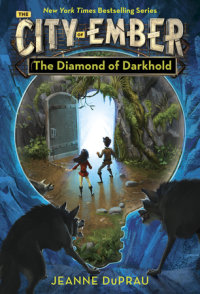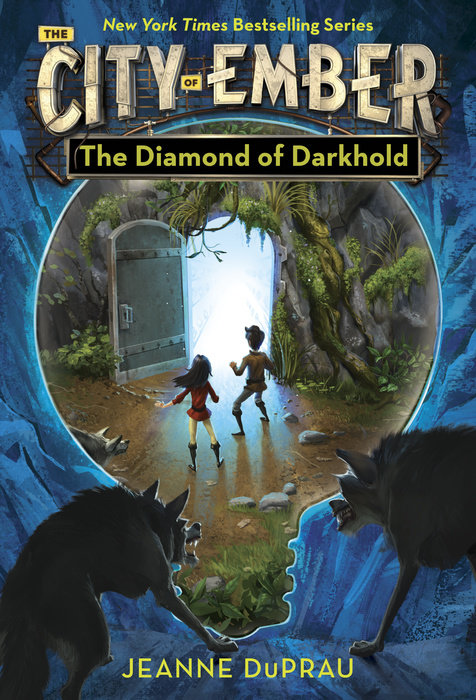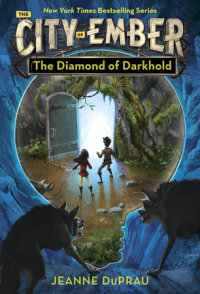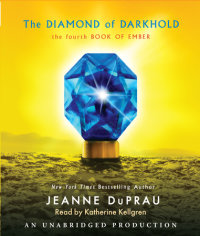In the village of Sparks, the day was ending. The pale winter sun had begun to sink behind a bank of clouds in the west, and shadows darkened the construction field behind the Pioneer Hotel, where workers labored in the gloom. Winter rains had turned the ground to a soup of mud. Stacks of lumber and piles of bricks and stones stood everywhere, along with buckets of nails, tools, old windows and doors, anything that might be useful for building houses. Though the daylight was almost gone, people worked on. They were trying to accomplish as much as possible, because they could see that a storm was coming.
But at last someone called, "Time to quit!" and the workers sighed with relief and began to pack up their tools.
One of the workers was a boy named Doon Harrow, thirteen years old, who had spent the day hauling loads of boards from one place to another and trying to measure and cut them to necessary lengths. When he heard the call, he set down the rusty…
In the village of Sparks, the day was ending. The pale winter sun had begun to sink behind a bank of clouds in the west, and shadows darkened the construction field behind the Pioneer Hotel, where workers labored in the gloom. Winter rains had turned the ground to a soup of mud. Stacks of lumber and piles of bricks and stones stood everywhere, along with buckets of nails, tools, old windows and doors, anything that might be useful for building houses. Though the daylight was almost gone, people worked on. They were trying to accomplish as much as possible, because they could see that a storm was coming.
But at last someone called, "Time to quit!" and the workers sighed with relief and began to pack up their tools.
One of the workers was a boy named Doon Harrow, thirteen years old, who had spent the day hauling loads of boards from one place to another and trying to measure and cut them to necessary lengths. When he heard the call, he set down the rusty old saw he'd been using and looked around for his father. The workers stumbling across the field were no more than shadowy figures now; it was hard to tell one from another. Ahead of them loomed the hotel, a few of its windows shining dimly with the light of candles lit by those too young or old or ill to be outside working. "Father!" Doon called. "Where are you?"
His father's voice answered from some distance behind him. "Right here, son. Coming! Wait for--" And then came a sound that made Doon whirl around: first a shattering crash, and then a shriek of a kind he'd never before heard from his mild-mannered father.
Doon ran, squelching through the mud. He found his father sprawled on the ground beside a broken windowpane that had been leaning against a pile of bricks. "What happened?" Doon cried. "Are you hurt?"
His father struggled to his knees. In a hoarse, strangled voice, he said, "Tripped. Fell on the glass. My hand."
Others had gathered now, and they helped him up. Doon took his father's arm. Enough light remained in the sky for him to see what had happened: the palm of his father's hand was sliced open, gushing blood.
One of the men standing nearby tore off his shirt and wrapped it around the wound. "Make a tight fist," the man said.
Doon's father curled his fingers, wincing. Blood stained the shirt.
"We have to get to the doctor," Doon said.
"Yes, that cut needs stitching up," said the man who'd given his shirt. "Go quick, and maybe you can make it to the village before it rains."
"Can you walk, Father?" Doon asked.
"Oh, yes," said his father in a weak voice. "Might need another . . ." He trailed off, holding out his hand, and Doon saw that the shirt wrapped around it was already soaked with blood.
"Ice would slow the bleeding," someone said. "But we don't have any."
A woman took off her scarf and passed it to Doon, and another man ripped strips of cloth from his shirt. Once the injured hand was wrapped in these, Doon and his father started across the field.
"You'll need a lantern!" cried a boy--one of Doon's friends, Chet Noam. "Go on ahead. I'll get one and catch up with you."
They walked as quickly as they could, but it seemed unlikely they'd avoid getting wet. A few raindrops were already drifting down. Doon felt their light, cold touch on his face. Rain had become familiar to him by now. Since he and his people had arrived here in Sparks from the city of Ember, where sun and rain alike were unknown, four rainstorms had swept over the land. The first had terrified the people of Ember, who thought something dreadful had gone wrong with the sky.
A voice called to them from behind, and Chet came running up. "Here," he said, handing Doon a lantern made of a can punched with holes and containing a burning candle. "And listen," he added. "A roamer has arrived, wanting shelter at the hotel. Tell people that if the rain stops, there'll be trading in the plaza tomorrow morning."
"All right," said Doon. He and his father turned again toward the town and hurried on. "Is the pain very bad?" Doon asked.
"Not too bad," said his father, whose face was unnaturally white. "It is bleeding a lot."
"Doctor Hester will know how to stop it," Doon said, though he wasn't sure of that. The doctor did the best she could, but there was a great deal she couldn't cure.
They passed a grove of trees thrashing in the wind. Behind the trees, a little distance off the road, a tall building loomed. A patch of blackness showed where a section of its roof had fallen in.
"They still haven't fixed it," said Doon as they went past, but his father didn't even look up.
The damaged building was called the Ark, the place where the people of Sparks stored their food supplies. The first rainstorm of the winter had been too much for one of the many rotten spots in its roof. Beams and chunks of tile fell inward. Shelves toppled. Jars and crocks broke and spilled, sacks of grain tore open, and rats got to the food before the cave-in was discovered. Even to begin with, there had been barely enough food stored in the Ark to get everyone through the winter. After that storm, a great part of the food was ruined.
"Father," Doon said. "Press your hurt hand tight with your other hand. That might keep it from bleeding so much." His father nodded and did as Doon said.
The rain came harder. In the last rays of evening light, Doon saw the lines of water like silver pins in the air. He put up the hood of his jacket, shivering. When he was faced with troubles, Doon usually looked for solutions and took action. But tonight he was feeling disheartened. So much about the winter in Sparks had been hard. People were ill with coughs and fevers, and some of them had died; they were hungry nearly all the time; and there had been one accident after another. A candle flame caught a curtain and set a house on fire; a toddler wandered outside at night, fell into the river, and drowned; there was the hole in the Ark's roof; and now this gash in his father's hand. Misfortunes came from every direction, it seemed, and Doon could see no way to make things better.



